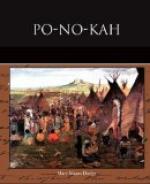Sometimes, too, the women danced, but always apart from the men. Even in their games the warriors and squaws never played together. Among the Crow Indians, famous for their long black hair, it was not uncommon for a thousand young men to play in one game of ball for three or four consecutive days without interruption. As soon as one player retired, exhausted, another took his place. Often hundreds of women played together, and they were generally as expert as the men in throwing and catching the ball.
Another strange feature among Indian customs, was the importance attached to the medicine-bag. Every warrior had one, and would no sooner hunt, or go to battle, or appear among his tribe without it, than he would neglect to wear his bow or his scalping-knife. Not that the bag contained any medicine, such as we understand by the word—for it was nothing but a small piece of skin sewed like a bag, curiously ornamented, and stuffed with straw or leaves—but because he regarded it as a charm. With him, “medicine” meant some mysterious power that would protect and guide him, and propitiate the unseen powers in his favor. When about to obtain his medicine, the young Indian went alone to some solitary river or lake in the depths of the forest, or mounted to some lonely peak. Here he fasted, and remained until, sleeping, he dreamed. The first animal he dreamed about, whether it were a bear, buffalo, deer, weasel, or bird or reptile of any kind, became his “medicine” forever. He at once hunted until he found one, and obtained its skin for a bag.
Rudolph and Kitty looked with awe upon many of the rare medicine-bags of the tribe, though they were never on any account allowed to touch them. Indeed, Kitty had managed to make a rough little one for Rudolph, dotted with clumps of beads, and he wore it next his heart with secret pride. The little fellow had once, while tramping through the forest with Katequa, seen a number of deer gathered around a spring, or salt-lick, as it is called, and had quivered with frightened delight to see the finest one fall wounded by her arrow. When the large eyes of the wounded creature had turned plaintively toward him, he had tried not to feel sorry, but his heart ached in spite of his efforts,
“I shall be a mighty hunter one of these days,” he said to Kitty on his return; “but I won’t shoot deer, for they look at you just as if they wanted to speak. I’ll get bears though, lots of ’em, and buffalo; and I’ll have a fine trap when I get home, and catch badgers and foxes, just as the Indians do.”
Tom and Rudolph saw with indignation that, throughout the village, the labor and drudgery were forced upon the squaws, while the warriors stretched themselves lazily upon the ground, or smoked their pipes under the spreading trees. As for Kitty, she was too busy watching the women cook, dig, chop, and carry, to make any moral reflections.
She loved, also, to sit beside them when they prepared the skins brought in from the hunt, or while they were busy with their curious sewing, so different from that with which she had seen her mother occupied.




